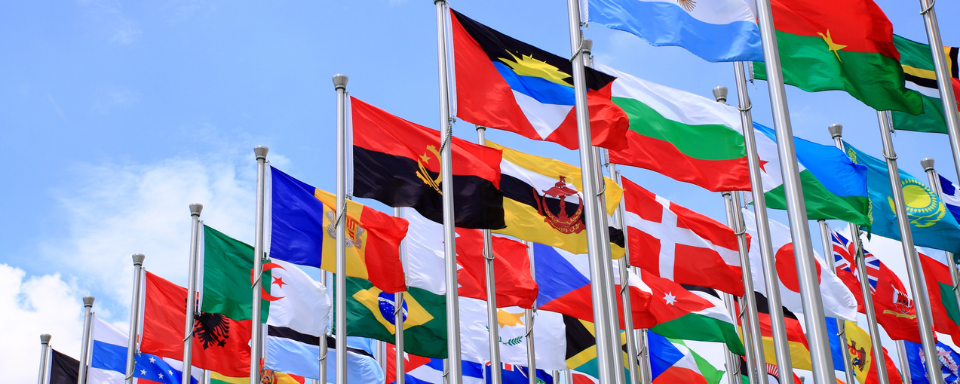
Interview on working with translators with Arianne des Rochers
The literary landscape of Canada is composed of a multitude of voices and languages, and literature in translation is a vital part of it. On the international stage, Canadian literature shines when translated into other languages, bringing distinctly Canadian culture and perspectives with it.
To kick off our blog series on translation and international publishing, we spoke with Arianne Des Rochers, Vice President for the Atlantic Provinces at the Literary Translators Association of Canada (LTAC), to discuss topics of interest for independent Canadian publishers who want to start working with literary translators or wish to learn more about the process.
About Arianne
Arianne Des Rochers is a literary translator, scholar and professor currently based in Moncton, in unceded Mi’kma’ki. They have translated or cotranslated, into French, books by Leanne Betasamosake Simpson, Glen Sean Coulthard, Leslie Kern, and Vivek Shraya. Their translation of Joshua Whitehead’s novel Jonny Appleseed was shortlisted for a Governor General Literary Award in 2020. They are currently working on the French translation of Kate Briggs’ This Little Art and, in collaboration with Olivia Tapiero, of Billy-Ray Belcourt’s A History of my Brief Body, both of which are forthcoming in 2023.
1. Can you tell us a little about yourself and how you became a translator?
Even though I come from a monolingual French family and background, I’ve always had an ease and, most importantly, a curiosity with language, which is why I decided to do undergraduate studies in translation. After a specialized BA in translation at Concordia University, I decided to pursue a Master’s degree in literary translation at the University of Ottawa. This is where I first discovered translation theory, and when I started articulating my own critical perspectives on what translation is, what it ought to be, and how I can practice it according to my own values. In short, I came to literary translation via formal university training, which is not the case for all literary translators.
2. How can publishing works in translation benefit an independent Canadian publisher, at home and abroad?
This is a question with many ramifications, but I will focus on two major aspects here. First, translating works by authors who experience a certain success in their language of publication definitely brings cultural, or symbolic, capital to a publisher’s catalogue, reputation, and image in general. It also signals an open-mindedness to underrepresented voices in the target culture (for instance, minority French voices in English translation, or Indigenous voices in French translation). Secondly, translation is largely subsidized in Canada – through the Canada Council for the Arts Translation grant program. As with any other book, publishing a translation is always a gamble in commercial or financial terms, but these grants are a great way to incite publishers to publish translations!
3. What qualifications or qualities should a publisher look for in a literary translator?
Translators often joke that the most appropriate answer to any question about translation, including this one, is: it depends. It always depends on the context. Here, I’d say it depends on the book that the publisher is seeking to translate and publish. Depending on the types of challenges the book poses, who wrote it, and when, and in what form, the publisher should always look for a translator that is more or less equipped, available, and willing to put in the work that the book is asking for or needs. For instance, certain translators specialize in poetry, or with slang, or have strong ties with the community of which the book is part (e.g. the queer community) or with the author (in the case of a friendship, for instance), and these “specializations” or inclinations should be considered, depending on the project. At the end of the day, however, I feel like good qualities any translator should have are humility, curiosity and willingness to learn, readiness for being challenged and unsettled, and ability to work with a team (which is also what I look for in humans in general, hah!). An emerging translator with no prior experience with a specific kind of text can 100% deliver the merchandise, provided they are well accompanied and that they go the extra mile to educate or familiarize themselves.
4. Publishers might either wait for translators to pitch a title for translation or pick a title and approach a translator with the project. What are the advantages and disadvantages of each method?
For publishers, receiving a pitch from a translator is, in my view, a golden opportunity, least of all because the translator will have done quite a lot of (free) labor (reading a lot of books before they find one to pitch, getting in touch with authors/publishing houses, making sure the rights are available, etc.) in the hopes that a publisher will agree to pick up the project and hire them. Translators are usually very knowledgeable when it comes to the source culture and its literary production, so publishers without a doubt benefit from their connections and insights. For instance, when I pitched Leanne Betamosake Simpson’s Islands of Decolonial Love in 2017, her work was completely unknown in Québec, even though she was exploding in other parts of the country. Now, we’ve translated 4 of her books (with a fifth on the way), and she’s become a staple in Indigenous literature in Québec. In the other scenario, where publishers pick a title themselves, they have to find ways to stay informed about literary production in other languages (by looking at awards shortlists, for instance), which is not necessarily their top priority. Also, they will tend to focus more on the award-winning titles who have greater success, which means that they can neglect lesser-known, but more relevant or interesting titles. As for finding a translator for a project picked by the publisher, it can be fairly easy; even though the intended translator might not be available or interested, a lot of talented emerging translators are looking for projects!
5. If a translator pitches a title to a publisher for translation, how might the publisher assess whether to move ahead with the project or not?
I’m not a publisher, so I’m not sure I can answer that question properly. As a translator, I can attest to the originality and the quality of a project that I would pitch to a publisher. The main reason that compels me to pitch a book to a publisher is when a book in English does or says something that is absent or unheard of in French/in the target literary culture. In other words, the originality of the project is something to look after: if the book’s proposition is similar to other books already being published in the target language, then it’s probably not relevant to translate a book that engages with the exact same topics or is written in similar ways. Of course, the topics or themes in the book also should be relevant to the target culture. I sometimes find that books that are way too specific in terms of content (be it in terms of location, cultural references, etc.) are harder to sell in a different location. Finally, the level of difficulty for translation is something to at least think about; certain books, especially experimental poetry, are near impossible to translate (which does not mean that they shouldn’t be translated, but that the expectations in terms of results, subjectivity, and “fidelity” should be set accordingly). And I will say that it is of utmost importance for publishers to read the books in-depth prior to moving forward with a project so as to not have any bad surprises later during the project.
6. What should publishers keep in mind when building a roster of translators or deciding which translator to choose for a particular project?
For building a roster of translators, I’d say the most important thing would be to work with a team comprised of translators that come from different backgrounds and experiences, both in terms of translation experience or “specialization,” and in terms of experiential knowledge and social identities such as age, gender, race, class, and so on. When deciding which translator to choose for a particular project, it’s important to identify the project’s needs according to the book’s content and/or form, and to go with a translator that has experience with the kind of project or experience at play, or with a translator that has room for putting efforts into familiarizing themselves with the issues at hand. I would also add that publishers should prioritize marginalized translators (such as Black translators, Indigenous translators, transgender translators, and so on) so as to play an active role in the diversification of the very homogeneous milieu of literary translation in Canada today.
7. Translators are often seen as key players in securing international translation rights. How do you understand the role of the translator in this process?
Translators are often the “face” of a translation project, at least behind the scenes, so they can always help secure translation rights, both at the national and the international level. I think translators can be key in that process by getting in touch and building a relationship with the author, having connections in publishing houses elsewhere in the world, and so on.
8. How does working with a translator compare to working with an author?
Again, I’m not an author so I’m not sure I can properly answer this, but I feel like there may be more similarities between working with an author and working with a translator than we would think. Translators are also, in some way, authors: they creatively produce new unique texts, only on the close basis of another text. They constantly make creative decisions, and they take a lot of aesthetic risks, and publishers have to understand and respect that. It’s important not to only see translations as flawed (i.e., try to find all the “mistakes” they contain at the editing process, for instance), but to engage with them as creative works of their own rights, and to engage with these texts as one would do with “original” texts (i.e., more carefully, as part of a dialogue, and trusting the translator).
9. Tell us about the role of the original author of a work, if any, in the translation process.
Again, this depends, mostly on the author. Some authors might not speak the language of the translation, which limits their ability to be involved in the translation process, while others may speak it very well. Some authors might be extra curious about the translation process and be very available and present, while others are too busy or simply don’t care that much. Some authors sometimes can be dead! So, it really depends on the author’s personality, their availability, their own limitations, their interests. The role of the original author of a work can range from a total absence to working very closely with their translators, including reading and editing the translation and having a say in most decisions being made. In general, though, I’d say most authors agree to answering our questions. Most authors I’ve translated have agreed to meeting in person (when possible) or on Zoom at least once, but for the most part remain at a distance throughout the process. I personally enjoy when my authors participate to a great extent, because that way we build a more trusting relationship, but again this also depends on the translator.
10. What are some best practices for publishers to keep in mind when working with translators?
Financial compensation is of utmost importance. The Canada Arts Council funds translation for Canadian-authored works at $0.18 per word for prose, which means anything below this would be substandard. Also, make sure to compensate translators for the extra labor they’re often asked to perform, such as helping with the book’s promotion, writing a translator’s preface or note, or participating to general editorial meetings. Otherwise, treating translators with care, as any publisher should do with anyone, is key, both in terms of their needs and demands (for instance, an extension) and in terms of their work (i.e., a translation can feel really personal, and dealing with harsh or impersonal edits and revisions can sometimes be frustrating). Translators know the books they work one better than anyone else (including, sometimes, the author!) and their interpretation, knowledge and recommendations should always at least be genuinely considered. Finally, a publisher should always promote and defend their translators’ work, for instance in the face of unfair criticism, because they too are accountable for the published result.
11. How does Literary Translators Association of Canada (LTAC) help connect literary translators with publishers?
The LTAC provides a directory of its members on its website where publishers can browse the profiles of potential literary translators according to their language combinations, specializations, and previous relevant experiences. The LTAC also frequently organizes public events such as roundtables, workshops, or readings where translators and publishers can come together. Finally, publishers can contact the LTAC directly should they have any question or project!
Interview originally conducted in English and translated into French by Josée Latulippe.

